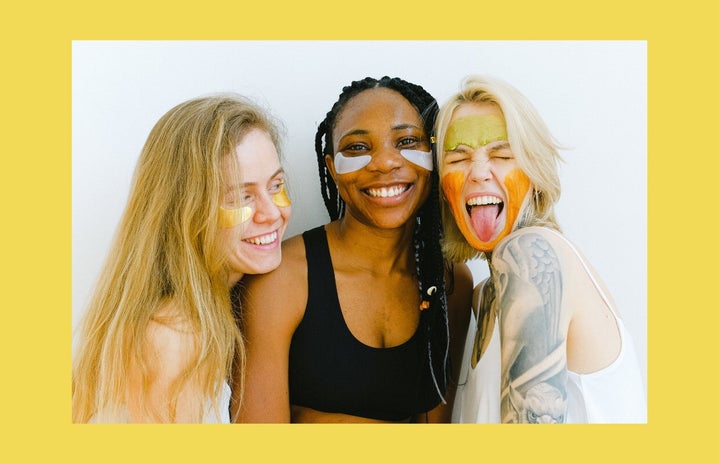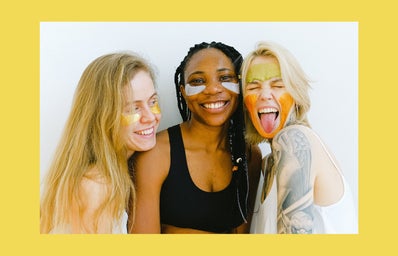Unless you’re one of those people that is truly genetically blessed, you’ve probably had acne in some capacity in the past. Acne can be so painful for so many reasons. One, it’s literally physically painful — having inflamed, hormonal acne can be so uncomfortable. Secondly, it completely depletes your self-esteem. The underlying issue with this is that we shouldn’t let it affect our opinions of ourselves, but decades of acne-shaming in our society have made it nearly impossible for those with acne to feel confident.
Personally, I’ve struggled with acne since about 8th grade. I distinctly remember asking my mom if I could try Proactiv, which promises to be an acne miracle solution — it didn’t work. In high school, I went to the dermatologist and got prescribed a topical treatment with benzoyl peroxide, and let me tell you something. That sh*t worked.
Fast forward to college: the benzoyl peroxide stopped losing its effect. I tried Curology, I cut dairy out of my diet, I got facials, facial rolling, steaming, toothpaste on your zit, drying lotion, birth control — you name it, I’ve probably tried it. Thinking about all the money I’ve spent on skincare that promised to “get rid of acne” is SAD.
Fast forward, one more time, to about 5 months ago: I started breaking out like never before. I had never really had truly painful cystic acne, it was always just some inflamed bumps here and there — nothing compared to the sh*t show that randomly starting appearing on my face a few months ago. I wasn’t doing anything different and had no clue why my face all of a sudden started breaking out so badly. It felt like my skin had a personal vendetta against me. I had terrible, painful cystic acne all over my face, and besides the fact that it was physically painful, it was also so emotionally draining. I dreaded going anywhere without makeup, and god forbid I caught a glimpse of myself in the mirror without heavily concealing the red bumps all over my face. I decided that, if my dermatologist at the time hadn’t done anything to truly help, it was probably time to switch to a new one. So, that’s what I did.
I went to my new dermatologist, and she initially suggested Accutane, which is a pretty harsh, federally distributed (yes, you read that correctly) drug that patients typically have to take for about 6 months. One of the factors that are involved with going on Accutane is getting your blood drawn once a month to make sure you’re not pregnant because Accutane can cause some serious birth defects. I have a ridiculous fear of needles and blood, so that wasn’t really a feasible option for me at the time. I asked for an alternative.
She ended up prescribing me an antibiotic called Doxycycline, a continuation of my benzoyl peroxide treatment, a diuretic medicine called Spironolactone, and a topical retinoid called Tretinoin. If you read that and thought “whewwww chief, that’s a lot,” you’re right.

The Doxycycline, an acne-fighting antibiotic, was to be taken for three months. Benzoyl peroxide was every night after washing my face and moisturizing and all that jazz. The Spironolactone, a medicine that essentially blocks androgens (a type of hormone that can often cause acne), which later prevents hormonal breakouts, was to be taken once daily, and since it’s not an antibiotic, I can basically take it forever. The Tretinoin was to be started once a week, and as my skin built up a tolerance to the topical treatment, I could use it more frequently.
The first three options were totally doable. I can take medicine, no problem, and I had been putting benzoyl peroxide on my face anyway. The tough part was the Tretinoin. Tretinoin is a form of retinol, and retinol is great for turning over skin cells and giving brighter, more even complexion. Because of the cell turnover caused by the vitamin A derivative in the medicine, it also is great for fighting acne — but at a cost. The first 4-6 weeks that you are on any prescription-grade retinoid are HELL. So much so, that it’s often called “the retinoid uglies” (seriously, it’s a thing, look it up.) As your skin is getting adjusted to the formula, it makes your skin super red, dry and irritated, and, it makes your skin peel. Fun! I decided that I simply could not handle the emotional burden of having acne and peeling skin, so I made the executive decision to wait to try the Tretinoin until the medicines started kicking in, and then giving it another go.
Lo and behold, the medicines did start to work. I noticed that my acne slowly (and I mean SLOWLY) but surely started clearing a little bit, and I was pretty excited. I still had lots of post-inflammatory hyperpigmentation (which is also called PIH), which is basically the aftermath that previous pimples leave on your face. The cycle! never! ends!
As my acne started clearing from the meds, coronavirus plagued the world and I had to ship back to my childhood home. I was done the Doxycycline at that point, and I figured, if I’m going to be home for a good while, and I’m not going to be seeing anyone or wearing makeup, I may as well start the Tretinoin. Just as I anticipated, the first four weeks were chock full of peeling skin, redness and irritation (oh my!) Eventually, it calmed down, and I started using it almost every night.
When I tell you that using Tretinoin is the best thing I ever did for my skin, I truly mean it. I definitely have to attribute a lot of my acne healing to the Doxycycline, as well as the Spironolactone, which I can thankfully take until I decide to have kids one day (you can’t be on Spiro while pregnant), but the tretinoin!!!!! I wouldn’t say my skin is anywhere near perfect, I still have some scarring and get an occasional hormonal zit. But, my skin is astronomically better than what it was five months ago — it’s glowing, my face is almost completely free of active breakouts, and I think I really have the Tretinoin to thank for that.
So, if you’re struggling with hormonal acne, first know that you’re not alone. Having acne can feel so isolating and debilitating, and it almost completely ruined my self-confidence, which is genuinely sad, thinking back on it. I wish I could say that, if my acne chose to punish me again in the future, I could shrug it off and be totally fine with it, but I hope and pray that my acne won’t ever come back with that much of a vengeance. It is so unbearably frustrating to hear people say things like “Have you thought about cutting out dairy?” or “Maybe you’re too stressed!” or, my classic fave, “Just wash your face!” If people haven’t experience having hormonal acne themselves, they don’t understand. But, having been through the acne ringer myself, I can really empathize with others who struggle.
I am still taking the Spironolactone every night, and after I cleanse with the CeraVe hydrating cleanser, followed by the Neutrogena sensitive skin moisturizer, I put on a thin layer of the Tretinoin. Compared to the layers and layers of acids, serums, and acne-fighting chemicals I used to put on my face, this is a walk in the park. As I said, I still have some PIH leftover, but the Tretinoin will gradually help those dark spots fade. I can’t describe how grateful I am that I found a system that works for me, and I know that I always find reading the experiences of others often helps me solve my own issues, so I hope this can help someone else out there who is struggling too.




